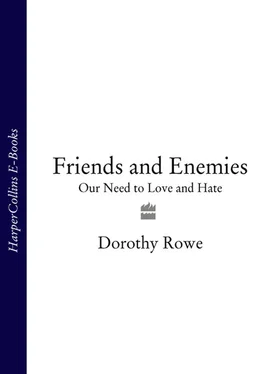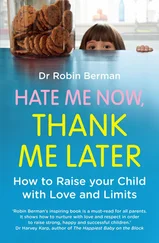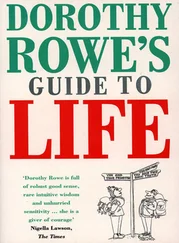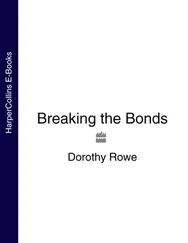When it came to friendship James waited to see how things turned out. He was very friendly. He bestowed his warm, gracious smile on everyone immediately on meeting and in every interaction and seemed so unlike many of the Beirutis, whom the war had left tense and wary. When I asked him about friends he told me that he might meet a person on one occasion and then on another, and each time all would be right no matter how long the time between meetings, and then, perhaps, they would meet and everything would not be right. So, with all his friends, he would just wait and see how things turned out.
He said, ‘When people say to me, “I love you, James,” or, “I’m your friend,” I wonder what it is they want. I wait, I wait and see what happens.’
I did not ask James what he did if ‘what happens’ was not to his liking. I felt that this would take us into issues of religion and of race, and these were not safe issues to discuss in a bar in Beirut.
However, in South Africa, the enemy is a common topic of conversation. Our guide to the prison where the enemies of the apartheid regime had been incarcerated on Robben Island had been imprisoned there from 1963 to 1978, when prison conditions were at their very worst. He told us, ‘The guards and security were my enemies. Robben Island was my first and last enemy.’
His last enemy has now lost power, and life in post-apartheid South Africa is full of ironies. Ex-political prisoners take visitors to a respectful viewing of cell number five, which once housed Nelson Mandela, while in Johannesburg my guide to another holy of holies, the Voortrekker Monument, was Simbo, a Zulu from Soweto, that south-western township established to separate the blacks from the whites.
The Afrikaner apartheid regime had been based on the belief that God had created blacks inferior to whites in order that they should work for the whites. Mamphela Ramphele, now Vice-Chancellor of Cape Town University, mentioned this in her autobiography. She began her professional education at Bethesda Teacher Training College, which had been started by Dutch Reformed Church missionaries in the 1930s. She described how the white teachers kept their distance from the black students and how the students were compelled to carry out huiswerk (Afrikaans for ‘housework’),
which was a form of forced labour intended to remind students that education was not an escape route from the inferior position blacks were ‘destined’ to occupy … The principal’s wife, Mrs Grütter, who was our music teacher, was the most unpleasant of all [the teachers]. She often reminded those students who seemed to her unenthusiastic in their tasks: ‘You were born to work for us.’ 2
Simbo, like Mamphela, found that his life changed markedly when apartheid came to an end. He obtained a most sought-after job, that of a tourist guide. Simbo drove me to the Voortrekker Monument, which looks like a huge, old-fashioned radio set upon a high hill. It was built to impress on all the implacable power and virtue of God’s own people, the Voortrekkers, who had fought and defeated the Zulu nation and established their own fair land, only to have it taken from them by the treacherous English. Inside the monument Simbo conducted me around the carved frieze on the four walls of the large interior room. Here the history of the Great Trek was depicted, and Simbo knew it well. He pointed out the different characters – the Boer men were all brave and handsome and the women all beautiful and true – and he showed me how the Boers had enslaved the blacks.
When we had finished our tour of Pretoria and set off back to Johannesburg I asked Simbo if he had any enemies. In answer he spoke of individuals who might know him personally but did not wish him well.
I asked him how he felt about the Afrikaners. I said, ‘When I was here last in 1991 you wouldn’t have been allowed anywhere near the Voortrekker Monument.’
He smiled and talked gently about the pass laws which restricted black and coloured people to certain areas. ‘See those women?’ he said, pointing to two African matrons walking home from work. ‘If they’d been there and didn’t have their pass book they’d be arrested and put in jail. Now I don’t mind the Afrikaners, provided they join with us and make this one country, all of us together.’
The Voortrekker Monument was for him a fine thing. It had given him what he wanted most – a job.
In Lebanon enemies still have power and so it was only in the privacy of a car that I was able to ask Samir, my driver, about friends and enemies as we spent three days together touring Lebanon. He was a large man in his late forties and knew Beirut and the roads in Lebanon and into Syria like the back of his hand.
One day I commented to Samir that wherever he stopped he got into conversation with someone. He seemed to have friends everywhere. He said, ‘I want to have friends everywhere and no enemies.’
I asked him if he had any enemies.
He shrugged. ‘How can you tell? You don’t know who your enemy is. Someone can come smiling, saying, “I am your friend,” and then, when you’re not looking, he hits you in the back.’
I asked a stupid question: ‘Are the Israelis your enemy?’
‘They are everyone’s enemy.’
Samir had good reason to regard the Israelis as enemies. In the war he had been a driver for foreign journalists, which meant he was often in danger of being killed by the Israelis or their allies. However, Samir’s interest in enemies went much wider. On our travels I discovered that he favoured the conspiracy theory of history. He was sure that Princess Diana had died as a result of a conspiracy by the Israelis and the royal family who, on discovering that the Diana-Dodi romance had resulted in her pregnancy, had had her killed. He was equally sure that Monica Lewinsky had been instructed by international Jewry to bring down President Clinton.
Over lunch in a garden in Balbek I gave Samir the benefit of my extensive knowledge of the royal family, garnered over the years that journalists have been asking me to comment on the latest events in the royal soap opera. I am a firm believer in the ‘cock-up’ theory of history rather than the conspiracy theory. I know that people conspire together, but I also know that stupidity usually triumphs. I assured Samir that Diana’s death was an accident, a result of the belief which many drinkers hold – that they drive better when they are drunk. Samir was completely unconvinced. He knew for certain that it was a conspiracy between the royal family and the Israelis to bring down not merely Diana but Dodi and thus strike at Dodi’s father, Mohammed al Fayed. I could see from his expression that he thought I was very naïve.
I should have remembered Robert Fisk and The Plot, and held my breath. Anyone who wants to try to understand why Lebanon, once a rich and flourishing country, is now in a state where a long, vicious war has ended but peace has not been made must read Robert Fisk’s Pity the Poor Nation . Of Lebanon after the war he wrote,
The events of the 1975–6 civil war have become a fixation for the Lebanese. Even today, the bookshops of Hamra Street and Sassine Square contain shelves of expensive photographic records of the fighting, coffee table books with colour plates in which readers can study at their leisure and in detail the last moments of a young Muslim militiaman before the firing squad, the anguished eyes of a Palestinian mother pleading for her family before a hooded gunman, a Christian family lying massacred inside their home. It is a kind of catharsis for both the Lebanese and the Palestinians who have long understood the way in which these terrible events should be interpreted. Victories were the result of courage, of patriotism or revolutionary conviction. Defeats were always caused by the plot: The Plot, the mo’amera , the complot , undefinable and ubiquitous, a conspiracy of treachery in which a foreign hand – Syrian, Palestinian, Israeli, American, French, Libyan, Iranian – was always involved. Edward Cody of the AP and I once came to the conclusion that in every interview we conducted in the Lebanon, a special chair should be set aside for The Plot – since The Plot invariably played a leading role in all discussions we ever had with politicians, diplomats or gunmen. 3
Читать дальше












